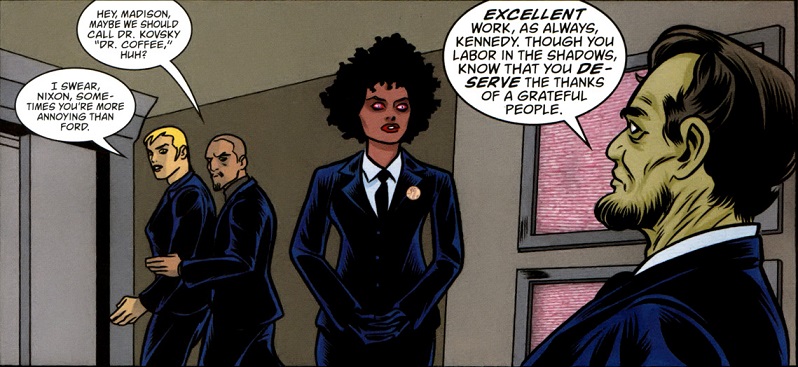iZombie Part II - The Comic
In my last update, I outlined the many reasons I think you should be watching the CW's iZombie series. Since he knows how much I like the show, for Christmas Mr. Menace decided to give me the iZombie omnibus - all 28 issues of Chris Roberson and Mike Allred's series packed into one (admittedly pretty hefty) volume. He'd read the entire series as it came out, and was curious to hear my take on it as a fan of the show. So after the holidays, I dove on in.

As I mentioned in my tv review, the show and the book share a name and a concept, but they diverge wildly in what they do with it. Think of them as cousins, rather than twins, or as happening on Earth-1 and Earth-2 if you prefer.
Like the show, iZombie the comic focuses on a young woman who wakes up one day in her own grave, with a compelling need to eat brains - without them, she can't remember who she is and will become a shambling abomination. Likewise in both, said brains produce the unfortunate side effect of giving our zombie gal the thoughts, memories, and personality traits of the former owners. However, unlike Liv Moore in the show, Gwen Dylan isn't a medical examiner, so her meals aren't necessarily the victims of foul play (some are, of course, but others have just died through the regular channels of incident and accident that plague us all in the end.) Gwen is a gravedigger for a "green" cemetery - ensuring that she can get her meals without side dish of nasty chemicals or the need to kill anyone.
Like Liv, Gwen does end up solving some mysteries and laying the unfinished business of her meals to rest, but here they serve as a propulsion toward a bigger, overarching plot - namely, the end of the world at the tentacles of a chthonic being named Xitalu, who feeds on the life force of entire planets. (Yes, he comes with his own herald, but no, he doesn't wear a snazzy purple helmet.)
As you might guess from that description, iZombie the comic is a lot more out there than the tv show. While the show tries to give zombieism a scientific explanation in the form of a bad drug interaction gone extreme, here the presence of monsters is explained by the concepts of an oversoul - a person's thoughts and memories; and an undersoul - their desires and physical impulses. These can be removed or combined when a person or animal dies to create a variety of supernatural creatures. And yes, that does mean there are monsters aplenty in the comic - Gwen's best friends are a ghost and a were-terrier, vampires are running the local paintball range, she's being hounded by a pretty-good looking mummy, and at least one local professor is up to some dubious medical experiments.
Added to the mix are two opposing groups - the Fossor Corporation, a secret monster-hunting society dating back to Medieval grave diggers, and the Dead Presidents, secret government agents who happen to be monsters (with appropriately presidential code names.)

If all that sounds like a lot to process, well, it is. But it's a testament to the storytelling abilities of Roberson and Allred that it all works and coheres anyway. Allred in particular does a seamless job of advancing the story through the art, knowing when to provide a huge splash page or complex panel breakdown and when to show more restraint. His style, with its watercolor tones and Pop art sensibilities, has rarely been better suited to a tale.

For his part, Chris Roberson clearly knows his mythology and monster tales, and he finds ways to work in as much of that knowledge as possible while not wandering too far off on a tangent. In the book's introduction, he gives a lot of credit to his editor, Shelly Bond, for keeping him from going too far astray.
Besides top-notch writing and art, I really liked the comic for some of the same reasons I like the show; namely, that I think it's a worthy portrayal of a modern young woman, even if she is a zombie. Gwen is a terrific heroine who cares about her friends and solves her own problems, ultimately rejecting the easy fixes offered by others for a better, if somewhat more difficult choice. For many of the side characters we also see variations on the different kinds of families people can build - it's almost more refreshing that it's not the main theme of the book but simply taken for granted.
Overall, the comic and the show are incredibly different, but both tell a story worth experiencing. If you've read it, tell me what you think!
